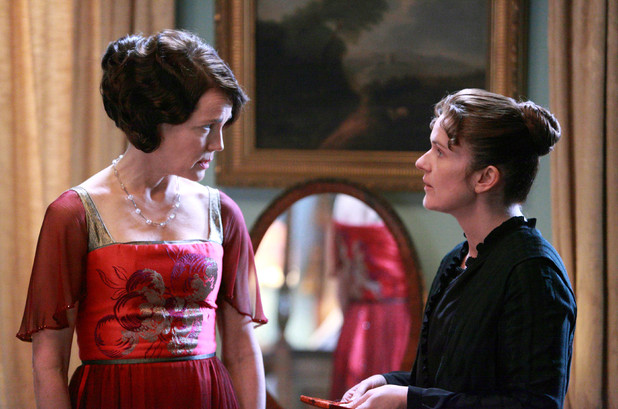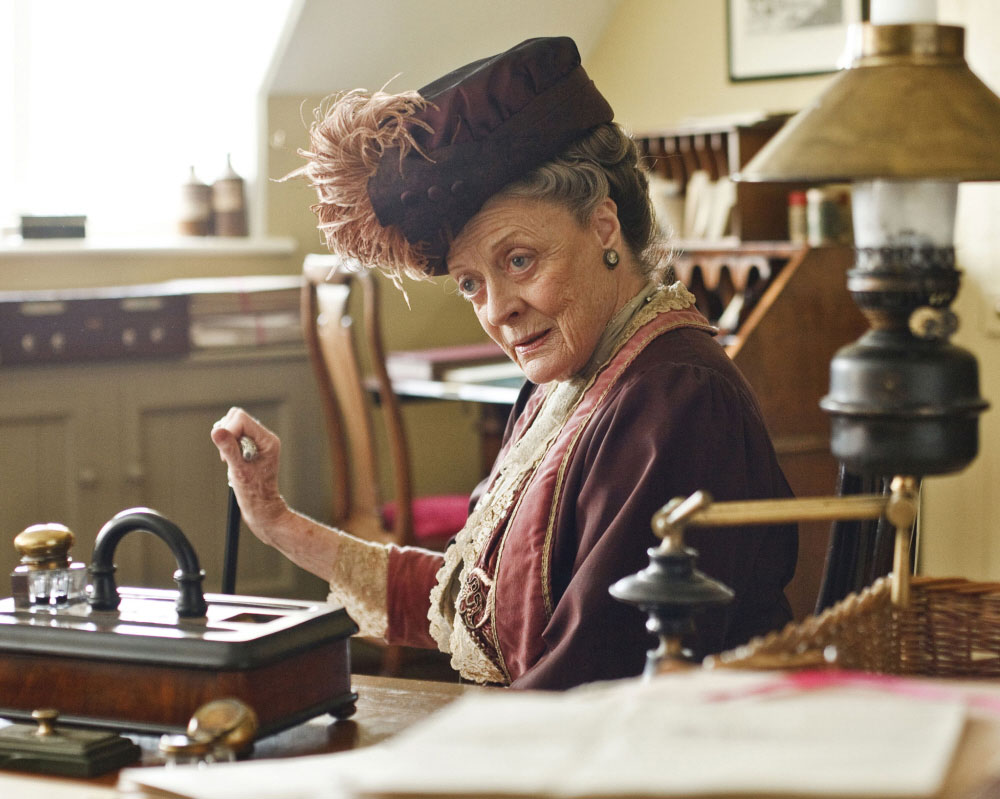THERE HAVE BEEN complaints. Downton Abbey, people are saying, has lost some of its polish.
It may be true; the soapy plot twists of Series Two replaced the carefully-crafted character development of Series One. Suspense over the fate of the entail, tied inextricably to Lady Mary’s suitor, which guided us through the first season, was brushed aside in favor of a clandestine romance between Lady and servant (a kind of sexless Lady Chatterley’s Lover), a potential affair between another Lady and a “local,” the estate overrun by injured WWI soldiers, a burn victim laying claim to Downton (a kind of sexless Martin Guerre), a miraculous recovery, the continuing saga of Bates and Anna finally consummated then sidetracked by Bates’ unpleasant wife, and the birth of a bastard child to a former Downton maid. Mercifully, we still had those zingers from the Dowager Countess and, more importantly, Lord Grantham restoring our faith in humanity with his unflappable integrity.
Some of my friends were less-than-impressed. The sophomore slump, attributed to second novels and second albums, is to be expected, disappointing as it may be. The Dowager Countess would certainly scold us. “A disappointment is hardly a disaster,” she’d say, wryly. “If that were the case, Great Britain would have given up after the American Revolution. I’d say that situation turned out better for all of us.”
Downton is a great big, costume-y soap opera on a small-ish budget. Amazingly, the show makes a few hundred thousand pounds look like a million bucks. Costume drama may be part of its draw. Maybe Americans have been so busy looking at themselves in the contemporary world that we need to see someone else in the mirror. I believe the answer to the mystery of Downton’s appeal is elementary TV development: we must like the characters. The people of Downton Abbey are the perfect protagonists in the battle against irony.
Edith Wharton’s The Age of Innocence, set in an era of judgment and sharp class distinctions, bears an ironic title, as much a comment on the 1890s as it was on the era in which Wharton scribbled it: 1920 (the very year in which Series Three of Downton Abbey unfolds.) Irony was something Wharton did exceptionally well, and when her seminal novel was published, Wharton’s brand of irony – intelligent, complex, thought-provoking – was like “a delicate, exotic fruit,” to inappropriately quote another great ironist. Today, however unfortunate, irony is omnipresent and more than a little tedious, my dear, what with everyone racing around in Happy Bunny t-shirts with slogans like, “I’m happy, don’t wreck it by talking.” Again the Dowager Countess comes to mind. She’d certainly sniff, “Is there much more variety to what you’re doing?”
American television is populated with characters so ironic you don’t know who to root for. There’s Don Draper (Mad Men), Carrie Mathison (Homeland), Nurse Jackie (Nurse Jackie), Sister Jude (American Horror Story: Asylum), Dexter Morgan (Dexter). Walter White (Breaking Bad), Tony Soprano (The Sopranos) and Tommy Gavin (Rescue Me) also proved compelling while they lasted, making those shows into hits for the networks which gave them the green light. These characters – so fascinating to watch – are also so complicated or morally ambivalent or both that we don’t know which side they’re on, and in the case of Emily Thorne/Emily VanCamp/Amanda Clarke from Revenge, even what name to use. Don’t get me wrong – these shows make excellent viewing, and at least two of them have not suffered the same writing complaints as Downton Abbey.
With Downton, though, we get assurance, escapism, ideals. We also get certainties of which The Earl of Grantham and his wife (played with radiant warmth by Elizabeth McGovern) would certainly approve. If you walked through the doors, a footman would guide you, Carter would announce you, Anna would smile at you and Mrs. Patmore would provide a sophisticated meal. There might be some embarrassments at table but the service would be impeccable – unless of course a little drama caused a minor upheaval. But even then we know Robert Crawley would struggle with his conscience before doing the right thing. His mother would object strongly before hitting us with a truth exposing her loyalty and her righteousness. We know Isobel Crawley would top even the Dowager’s morality. The servants might have something to say about it, what with O’Brien pinching her face whenever she gets a chance. But even O’Brien was redeemed by a glimpse of humanity in the glow of Lady Grantham’s trust.
Other certainties are in the performances. There isn’t a rotten apple in the barrel. It is an ensemble of performers equally committed and equally skilled in their duties. Each, in turn, has had a satisfying moment in which to shine. It almost seems unfair to single anyone out when there is such uniform excellence but I’m especially fond of Penelope Wilton as Isobel Crawley, Siobhan Finneran as O’Brien (her first name is pronounced shi-vaughn), and Hugh Bonneville. But screenwriters and actors take note: you can be 100% certain that Dame Maggie Smith will give you a lesson on the meaning of the word “wryly” every time she opens her mouth.
The Penguin edition of The Age of Innocence references Ralph Waldo Emerson in his essay Self-Reliance. “Society everywhere is in conspiracy against the manhood of every one of its members.” Sounds familiar. How little people change! With Facebook and TMZ skewering everyone for every misspoken word, with liars and cheats expecting that a public apology will make us forget their hypocrisy, and with countless sensationalist attempts at fracturing solid reputations merely to sell a story, to whom do we look? Who are our role models in the age of irony and cynicism? The people of Downton Abbey, that’s who.







Thomas, your writing is ever insightful andyou are cleverly wry yourself! Enjoying it all!
I agree with all you say, Downton appeals to me because you don’t hate any of the characters and yes, the actors are excellent. As you mentioned, Mad Men, The Sopranos, and though I don’t consider this show in the same league as far as quality, True Blood, all have reprehensible people. Though I love to hate those people, I probably wont ever by the box sets and revisit those shows.
Yes, Downton is on the lighter side of melodramatic possibilities. I wish sometimes they’d get truly down and dirty or at least dig deeper into the agony of some of the story lines, case in point, is it Edith(?), the maid turned prostitute, that ‘scene’ from last week should’ve been heart wrenching but I was left a little cold.
The Season 3 premier was a little disappointing especially Shirley MacLaine. What was up with that pasty white make up when her character apparently lays in the sun? She also didn’t seem at home in the skin of who she was trying to portray. I heard she’s not even in it much this season. I don’t know if she’ll ever truly show us who that woman is.
Still, I find it enjoyable and I like the character of the Irishman Tom for obvious reasons :)
John Summers (above) missed a vital detail in musing over Shirley MacLaine’s pasty (and to him, odd) white make-up. As was mentioned more than once, Cora’s mother, the American, loves the sun, but is also doing what for British ladies would have been quite unthinkable and scandalous for a proper lady in 1920 – wearing obvious, visible cosmetics! Hence the artifically rouged lips too. (Of course that propriety would soon change in the UK too – well before the decade was out.)
I also thought Shirley MacLaine played her role perfectly, and understood every nuance. The scene where she serenades Violet with “Let Me Call Your Sweetheart” – culminating in kissing her hand – was masterfully done, because what that gesture portrayed was left entirely to the viewer’s interpretation. Was Cora’s mother being playfully bitchy and sarcastic? Or was she showing the genuine, open, generous (and IMHO, quite American) trait of forgive, forget, move on and start afresh, even with those who vex and belittle you?
OK, I’m coming clean. I watch every week. It’s still fun (with one hearbreaking exception) but I miss the plotting from Season One and I still lust after Mr. Pamuk! I think Downton officially jumped the shark last Sunday night when Edith found out about her editor’s “wife in the madhouse.”
The Washington Post had a hilarious essay on Downton plots last weekend, claiming “Everybody Can Write One!” So here’s mine!:
Season 4: “Mr. Pamuk, secretly buried on the back estate of Downton, is revealed to be a vampire! He is dug up by Lord Grantham’s dog, and wanders into the female servant’s hall. “What ho! A man in the ladies hall?!? huffs Mr. Carson. “Off with ye, ye scoundrel!!!” Vampire Pamuk bites off Mr. Carson’s head, and blood spatters all over Lord Grantham’s dress shirts! Creepy Cricket Expert Servant From Isobel Crawley’s Place Whose Name I Don’t Remember” says “Hey, I know how to remove those stains!” Vampire Pamuk kills him too. Edith returns from London, and has an urgent call from her editor. His wife has escaped the asylum and is heading to Downton Abbey to stalk her down and kill her. “Oh dear,” cries Edith. “What should I do?” Lady Mary slaps her across the face. “Oh shut up, Edith! Stop being such a tiresome bore.” Matthew says “Err, now Mary, isn’t that a bit uncalled for?” Lady Mary slaps Matthew. Just then, the dog returns with something small and pink in is mouth. It’s a bar of soap!!!!! O’Brien, seeing the soap, screams and runs into the kitchen, overturning a giant bowl of oil and kitchen grease. Turns out that Branson is a mole for the IRA, and, and will use his new role as estate manager to finally reach the Snobby Old Guy In The Dining Room who spiked his drink and dump the bowl over his toff head! Curses, foiled again! Up the Republic!!! Bates enters the kitchen and slips on the greasy floor. Mrs. Patmore, who vainly refuses to wear her new glasses doesn’t see him and trips over him, piling up on top of him, The kitchen door is blocked, and no one can reach the dining room, where Lord and Lady Grantham, Violet, and The Hot New Actress Playing The Young Girl Who Ran Off With The Married Man are sitting. “Good Lord” grumples Lord Grantham, what can be keeping dinner?” Jimmy, his ego swelled from his recent promotion to First Footman, rushes to the kitchen. Vampire Pamuk kills him too.
Vampire Pamuk stumbles into the dining room and kills everybody except Violet, who grabs her silver-tipped cane and stabs him in the chest, causing him to disintegrate. The episode ends with her saying “Something very witty and wry which I have yet to figure out, but which will be said very wittily and wryly.” Cue Masterpiece Theater music!!!!!!!!